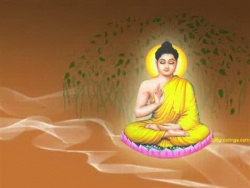Difference between revisions of "Buddhaghosa Thera"
| Line 1: | Line 1: | ||
[[File:0rgg.jpg|thumb|250px|]] | [[File:0rgg.jpg|thumb|250px|]] | ||
| − | |||
| − | |||
| − | |||
| − | |||
| − | |||
| − | 2. Buddhaghosa. Called Culla Buddhaghosa to distinguish him from the greater. He was a native of Ceylon (Gv.67), and two works are ascribed to him (Gv.63) - the Jātattagīnidāna and the Sotattagīnidāna. The former probably refers to the Jātakatthakathā (P.L.C.126). It was at his request that Buddhaghosa (1) wrote his Commentaries to the Abhidhamma. Gv.68 | + | |
| + | |||
| + | The greatest of Commentators on the [[Tipitaka]]. He was a [[Brahmin]]. The Sās. (p. 29) says his father was a [[purohita]], named [[Kesa]], his mother being Kesī. Gv.66 says his father was the [[purohita]] of [[King]] [[Sangāma]]. He was born in a village near [[Buddhagayā]] and became {{Wiki|proficient}} in the [[Vedas]] and allied branches of [[knowledge]]. One day he met a [[monk]], named [[Revata]], and on being defeated by him in [[controversy]], entered the Order to learn the [[Buddha's teachings]]. Because his {{Wiki|speech}} was profound, like that of the [[Buddha]], and because his words spread throughout the [[world]] (like those of the [[Buddha]]), he came to be called [[Buddhaghosa]]. While dwelling with [[Revata]], he wrote the [[Ñānodaya]] and the [[Atthasālinī]], and also began to write a [[Parittatthakathā]] (a concise commentary) on the [[Tipitakas]]. | ||
| + | |||
| + | In order to complete his task, he came over to [[Ceylon]] at the suggestion of [[Revata]] (Sās.p.29, says he was sent to [[Ceylon]] as {{Wiki|punishment}} for [[thinking]] himself wiser than his [[teachers]]) and studied the [[Wikipedia:Sinhala people|Singhalese]] Commentaries at the [[Mahāvihāra]], under [[Sanghapāla]]. When his studies were ended he wrote the [[Visuddhi-Magga]], and having thereby won the approval of the [[Elders of the Mahāvihāra]], he rendered the [[Wikipedia:Sinhala people|Singhalese]] Commentaries into [[Pāli]]. During this period he lived in the [[Ganthākaravihāra]], and on the [[accomplishment]] of his task he returned to [[Jambudīpa]]. ([[Burmese]] [[tradition]] says he obtained his copy of the [[Tipitaka]] and the Commentaries from the [[āloka vihāra]]. But see P.L.C.83, n.1.4). | ||
| + | |||
| + | Besides the above mentioned works of [[Buddhaghosa]], we have also the [[Samantapāsādikā]] and the [[Kankhāvitaranī]] on the [[Vinaya Pitaka]]; the [[Sumangalavilāsinī]], the [[Papañcasūdanī]], the [[Sāratthappakāsinī]] and the [[Manorathapūranī]] on the [[Sutta Pitaka]]. | ||
| + | |||
| + | He is also said to have compiled Commentaries on the [[Khuddakapātha]] and the [[Sutta Nipāta]] (called the [[Paramatthajotikā]]) and on the [[Dhammapada]]. He also wrote a series of Commentaries on the [[Abhidhamma Pitaka]] (the [[Atthasālinī]], the [[Sammohavinodanī]] and the [[Pañcappakaranatthakathā]]). | ||
| + | |||
| + | Some ascribe to him the [[Jātakatthakathā]]. For further particulars relating to [[Buddhaghosa]], see Law's "[[Life]] and work of [[Buddhaghosa]]" and P.L.C.79 ff. The account of his [[life]] given here is taken from Cv.xxxvii.215ff . For a list of works ascribed to [[Buddhaghosa]] see Gv., pp.59 and 68. | ||
| + | |||
| + | 2. [[Buddhaghosa]]. Called [[Culla Buddhaghosa]] to distinguish him from the greater. He was a native of [[Ceylon]] (Gv.67), and two works are ascribed to him (Gv.63) - the [[Jātattagīnidāna]] and the [[Sotattagīnidāna]]. The former probably refers to the [[Jātakatthakathā]] (P.L.C.126). It was at his request that [[Buddhaghosa]] (1) wrote his Commentaries to the [[Abhidhamma]]. Gv.68 | ||
Revision as of 16:58, 15 December 2015
The greatest of Commentators on the Tipitaka. He was a Brahmin. The Sās. (p. 29) says his father was a purohita, named Kesa, his mother being Kesī. Gv.66 says his father was the purohita of King Sangāma. He was born in a village near Buddhagayā and became proficient in the Vedas and allied branches of knowledge. One day he met a monk, named Revata, and on being defeated by him in controversy, entered the Order to learn the Buddha's teachings. Because his speech was profound, like that of the Buddha, and because his words spread throughout the world (like those of the Buddha), he came to be called Buddhaghosa. While dwelling with Revata, he wrote the Ñānodaya and the Atthasālinī, and also began to write a Parittatthakathā (a concise commentary) on the Tipitakas.
In order to complete his task, he came over to Ceylon at the suggestion of Revata (Sās.p.29, says he was sent to Ceylon as punishment for thinking himself wiser than his teachers) and studied the Singhalese Commentaries at the Mahāvihāra, under Sanghapāla. When his studies were ended he wrote the Visuddhi-Magga, and having thereby won the approval of the Elders of the Mahāvihāra, he rendered the Singhalese Commentaries into Pāli. During this period he lived in the Ganthākaravihāra, and on the accomplishment of his task he returned to Jambudīpa. (Burmese tradition says he obtained his copy of the Tipitaka and the Commentaries from the āloka vihāra. But see P.L.C.83, n.1.4).
Besides the above mentioned works of Buddhaghosa, we have also the Samantapāsādikā and the Kankhāvitaranī on the Vinaya Pitaka; the Sumangalavilāsinī, the Papañcasūdanī, the Sāratthappakāsinī and the Manorathapūranī on the Sutta Pitaka.
He is also said to have compiled Commentaries on the Khuddakapātha and the Sutta Nipāta (called the Paramatthajotikā) and on the Dhammapada. He also wrote a series of Commentaries on the Abhidhamma Pitaka (the Atthasālinī, the Sammohavinodanī and the Pañcappakaranatthakathā).
Some ascribe to him the Jātakatthakathā. For further particulars relating to Buddhaghosa, see Law's "Life and work of Buddhaghosa" and P.L.C.79 ff. The account of his life given here is taken from Cv.xxxvii.215ff . For a list of works ascribed to Buddhaghosa see Gv., pp.59 and 68.
2. Buddhaghosa. Called Culla Buddhaghosa to distinguish him from the greater. He was a native of Ceylon (Gv.67), and two works are ascribed to him (Gv.63) - the Jātattagīnidāna and the Sotattagīnidāna. The former probably refers to the Jātakatthakathā (P.L.C.126). It was at his request that Buddhaghosa (1) wrote his Commentaries to the Abhidhamma. Gv.68
